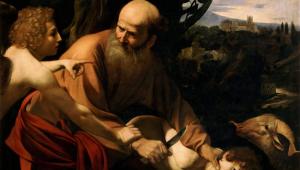Making sense of the sacrifice of Isaac is like wrestling alligators. And its interpretation is made that much harder by the free-floating nature of the story, the subsequent religious influence it has had, and the centuries of interpretation that has grown up around it.
Known as “The Akedah” or “The Binding” in the Jewish tradition, the story is celebrated in the Jewish tradition as “the supreme example of self-sacrifice in obedience to God’s will and the symbol of…martyrdom throughout the ages.” In the Christian tradition it is seen as a type or model for the sacrifice of Jesus. And in the Muslim tradition, where it is argued that it was Ishmael, not Isaac who was offered as a sacrifice, Abraham is seen as a model of obedience.[1]
Reading the Akedah is further complicated by our own historical distance – and the lack of it – from Abraham’s day. On the one hand, we find many of the elements of Abraham’s family story and the social mores of his day repellent. There’s the intrigue, the schemes to have a baby, the jealousy, fear, and doubt – the callous attitude toward life.
But at the same time, we suppress similar dynamics in our own day and time. Are we any less fearful? Are we any less likely to mistrust and co-opt God to make excuses for our behavior? Do we really value life more than Abraham and his relatives? Or do we just craft convoluted laws and complex institutions to do the killing for us? There are times when I am not sure whether it is Abraham we don’t like or the reflection of our own struggles that are played out in his life that repulses us.
The more I grappled with these issues and others, the more I realized that we need to set them aside, in order to understand the (almost) sacrifice of Isaac. We also need to remember that the story we read in chapter 22 follows on a series of other stories about Abraham that begin in chapter 11 and end in chapter 25. And it is the context of this long collection of stories – not the host of other considerations – that we should try to interpret Abraham’s “test” as Genesis describes it.[2]
So, what does reading this story in the context of the larger Abraham saga do for our understanding of the story?
First, it is important to note that all fifteen chapters of what is referred to as the “Abraham Cycle” revolve around God’s plan to save the human race and to do that through Abraham. He has been blessed that through him, God might bless the world. It is this theme and not the chaos and dysfunction of Abraham’s family, that is at the heart of the biblical story. Take that central message out of the equation and what you have is “Real Housewives of New Jersey” set in the Ancient Near East.
Now, the second thing to remember is this: The promise that God will do this through Abraham is based on the conviction that God is the Lord of life and the guarantor of humankind’s fertility – so offspring and family are at the heart of the story.
We have lost track of this fact that God is the Lord of life and guarantor of humankind’s fertility because we are so preoccupied with ideologies and politics that we are fairly sure that God doesn’t care about those matters. But the preoccupation of the Old Testament with families, children, and inheritances is perfectly congruent with what the book of Genesis describes as the problem we as human beings have had from the very beginning. Adam and Eve long to be their own gods. That longing alienates them – not just from God but from one another. And sooner, rather than later, that animosity extends to the second generation where – in the case of Cain and Abel – the whole misadventure ends in murder.
The problem, of course, is that – not unlike us – Abraham only half-believes the promises that God has made. And – like Adam and Eve – he and his wife, Sarah, can’t quite give up on being their own gods. So, all the way through the fifteen chapters devoted to their story, Abraham and Sarah display both a lack of faith and spiritual hubris.
Sarah tries to fulfill God’s promise that they will have a family by giving her maidservant, Hagar, to Abraham as a surrogate wife so that Sarah might take the baby. Abraham, displaying a similar lack of faith cooperates without argument.
When God tells Sarah that she will have a child, she laughs off the promise, displaying contempt for God. And Abraham displays a similar amount of contempt by trying to have Ishmael, the child he had with Hagar, circumcised as the child “God had promised”.
On a trip through Egypt and later, Kadesh and Shur, Abraham and Sarah display a lack of faith in God’s care by passing off Sarah as his sister. And when Isaac was finally born, Sarah and Abraham send Ishmael away so that he won’t be a competitor with Isaac.
This last fiasco brings us to chapter 22, and what’s important about the events that precede it is that the test Genesis describes does not take place in a vacuum. I think what we are meant to infer is that God has had it with Abraham’s half-hearted behavior and that it is time, not just to challenge that behavior but to bring home to Abraham that God is not just faithful, but he is the Lord of life and Abraham is not.
Verse one of chapter 22 reads, “After these things God tested Abraham…” But I can almost hear the writer say, “Having had enough of this, God tested Abraham…”
What follows, then, should not mire us down in a conversation about whether God approves of child sacrifice or would even toy with it. He doesn’t and wouldn’t. And Isaac is not an infant, he was probably about 37.
More importantly, Isaac is the instrument of God’s promise, given to Abraham in spite of his faithlessness and hubris. In other words, there is an almost parenthetical thought lying behind the command that Abraham “take your son, your only son Isaac, whom you love, and go to the land of Moriah” to the effect of: “And if you think that this is this is about sacrificing children, Abraham, then you are a bigger mess than I thought.”
We should also avoid getting bogged down in abstract conversations about whether God “tests” people the same way we “stress test” banks or train Marines at Parris Island. This is not a test in that sense, it is a challenge, a confrontation.
The binding, the Akedah of Isaac – not his sacrifice – is about bringing home to Abraham a point that he has been unable and unwilling to grasp: That his well-being and the future of God’s larger project of saving and healing is God’s project, not Abraham’s. So, when they finally get to Mount Moriah, prepare the sacrifice, and begin the process, the intervention of the angel is as much as to say, “Enough. I think that you finally get the point – and so does your son, my gift, the who will carry on in your footsteps.” And that message is this: God is author of life and the one who will provide.
Now, with that understanding of the story in hand, I think that we can talk with some benefit about its significance for our own lives, and here is some of what I believe the story tells us:
The central message is this: the spiritual life depends upon a radical trust in the promise of God. We cannot allow that trust to be eroded by life’s circumstances or by the apparent failure of that promise. More importantly, we cannot actively undermine that promise by taking life into our own hands. If we do, then we court disaster.
None of us are the progenitors of a divine, intergenerational promise – not on the scale of Abraham at any rate. But if there is any way in which we are more “advanced” than Abraham’s generation, it is probably in our capacity for hubris and imagining that we can play the role of God and do it well. And, as the story of Abraham makes clear, it is hubris that threatens to rob us of God’s promise and place us at peril.
There is not a week that I see go by that doesn’t speak to those dangers:
- We are convinced that we can seize control of life by reengineering our bodies.
- We are convinced that we can seize control of our lives by reimagining what it means to be human.
- We have convinced ourselves that we can put a stop to life anywhere it begins.
- We have decided that we can and should bring life to an end when and where we want to, even to the point of selecting categories of human beings who shouldn’t even exist.
- And now we are flirting with the possibility of creating lives – or at least a form of consciousness – that we have convinced ourselves we can control. Talk about hubris and the desire to be gods.
I marvel at the way we agonize that one day we might extinguish life on this planet in a single explosion, all the while euthanizing people on a daily basis. It would make the handwringing in some commentaries on Genesis over child sacrifice laughable, if it weren’t so appallingly immoral.
So, here is the challenge we face as the children of Abraham: How do we rest in his promise and live out of the conviction that he is the Lord of life? That’s not a question we can answer here but it’s a question we should be asking — before God is forced to test us.
[1] One of the more accessible and useful summaries of the Akedah’s history appears in the Encyclopaedia Judaica: https://www.jewishvirtuallibrary.org/akedah
[2] I am indebted here to the work of Benjamin Scolnic: https://jbqnew.jewishbible.org/assets/Uploads/483/jbq_483_scolniclifedeath.pdf













